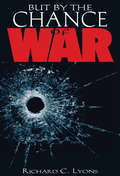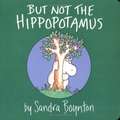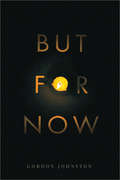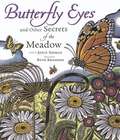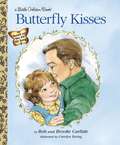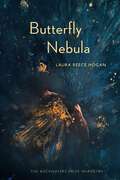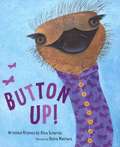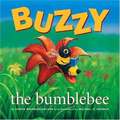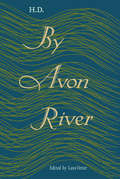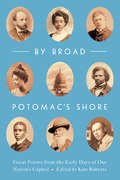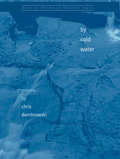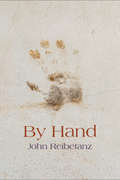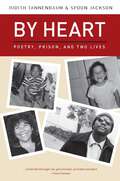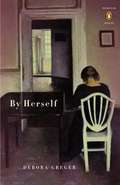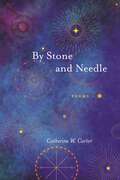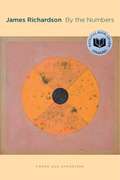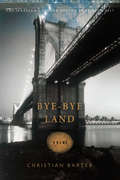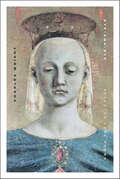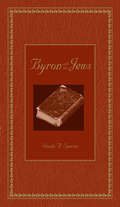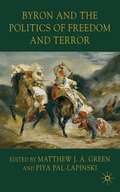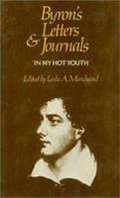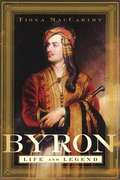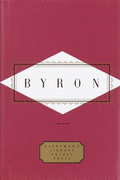- Table View
- List View
But By the Chance of War
by Richard C. LyonsBut By the Chance of War is a poetical and historical work, examining humanity's impulses for and reactions to war in various historical settings. It treats matters common to all conflicts and matters unique, given mankind's technological advances.
But Not the Hippopotamus
by Sandra BoyntonA shy hippo is hesitant to join in the fun that the other animals are having. But little by little, she finds her courage. A fine and funny book, with over two million copies in print, But Not the Hippopotamus is a classic favorite anytime book for little kids and their parents. Images and image descriptions available.
But for Now
by Gordon JohnstonFrom "Anna's Lovers" Our houses glow both from within and on the outside: their night lights and an almost perfect and wintry moon. The phrase "but for now" means among other things "making do," as if we had to settle for the bare minimum. In But for Now, Gordon Johnston presents poems where the mortal world is more than enough because there is more to it than the merely mortal and where it is possible to hear beyond the outmoded clanking of inherited religious vocabularies. These poems find moments of grace in chance occurrences and through a wide range of styles and methods, they choreograph the random casual events of our existence. Northrop Frye famously asked, "Where is here?" These poems instead ask, "When is now?" Engaged with worlds of waiting and of doing, with enduring and healing, But for Now celebrates music and noise, speech and silence, and asserts that for all the darkness at the edges, there is something shining at the centre of the painting.
But for Now: But For Now (Hugh MacLennan Poetry Series #27)
by Gordon JohnstonFrom "Anna's Lovers" Our houses glow both from within and on the outside: their night lights and an almost perfect and wintry moon. The phrase "but for now" means among other things "making do," as if we had to settle for the bare minimum. In But for Now, Gordon Johnston presents poems where the mortal world is more than enough because there is more to it than the merely mortal and where it is possible to hear beyond the outmoded clanking of inherited religious vocabularies. These poems find moments of grace in chance occurrences and through a wide range of styles and methods, they choreograph the random casual events of our existence. Northrop Frye famously asked, "Where is here?" These poems instead ask, "When is now?" Engaged with worlds of waiting and of doing, with enduring and healing, But for Now celebrates music and noise, speech and silence, and asserts that for all the darkness at the edges, there is something shining at the centre of the painting.
Butterfly Eyes
by Joyce SidmanDiscover the hidden world of the meadow in this unique combination of poetry riddles and science wisdom. Beginning with the rising sun and ending with twilight, this book takes us on a tour through the fields, encouraging us to watch for a nest of rabbits, a foamy spittlebug, a leaping grasshopper, bright milkweed, a quick fox, and a cruising hawk.
Butterfly Nebula (The Backwaters Prize in Poetry)
by Laura Reece HoganWinner of the Backwaters Prize in Poetry, Butterfly Nebula reaches from the depths of the sea to the edges of space to chart intersections of the physical universe, the divine, the human, and the constantly unfolding experience of being &“one thing in the act of becoming another.&” This collection of poems teems with creatures and cosmic phenomena that vivify and reveal our common struggle toward faith and identity. The longing and metamorphosis of the human heart and soul are reimagined in an otherworldly landscape of firework jellyfish, sea slug, stingray, praying mantis, butterfly and moth, moon and star, and celestial events ranging from dark matter and Kepler&’s Supernova remnant to a dozen classified nebulae. Our desire for purpose and renewal collides with the vast constellation of divine possibility in this collection, which invites the reader to enter a transformative world both deeply interior and embracing of the far-flung cosmos.
Button Up!
by Alice Schertle Petra MathersDid you actually think shoes, jackets, and hats didn't have personalitites? Think again! The outfits in this book are brought to vivid life by Alice Schertle's wry poetry and Petra Mathers's exuberant cast of young animal characters. From Joshua's cozy jammies to Emily's frilly undies, the duds on display in this perfectly stitched poetry collection are as unique as the critters who wear them.
Buzzy the Bumblebee
by Denise Brennan-NelsonScientific facts suggest that bumblebees should not be able to fly. Documented studies indicate that a bumblebee's wing span is too small for its body weight. Fortunately, bumblebees do not know this. Well, that is, except for BUZZY! Buzzy is a fun-loving bumblebee. He loves to fly! One day Buzzy reads the startling and shocking "scientific fact" that he should not be able to fly and he begins to doubt himself. He tried to make his wings work by pumping with all of his might. But the words he had read were stuck in his head and now something wasn't right! Buzzy was stranded on top of a flower, longing to fly away. His heart still knew how but his head had forgotten the way. Buzzy desperately wants to get home to talk to his mom and dad. But how? He couldn't fly anymore! Come along on Buzzy's challenge-filled journey and discover what can happen when you BELIEVE!
By Avon River
by H. D."Superb. Vetter's incisive introduction offers one of the first approaches to theorizing women’s late modernist literary production as advancing specifically hybrid works located at the juncture of personal, national, and nationalist concerns."--Cynthia Hogue, coeditor of The Sword Went Out to Sea "This edition, with its finely written introduction and meticulous annotation, opens up new understandings of H.D., the major modernist writer, as she meditates, postwar, on the inner life of Shakespeare, the icon of English literature, and on the women missing from his plays. A beautiful and thoughtful book."--Jane Augustine, editor of The Gift and The Mystery H.D. called By Avon River "the first book that really made me happy." In this annotated edition, Lara Vetter argues that the volume represented a turning point in H.D.’s career, a major shift from lyric poetry to the experimental forms of writing that would dominate her later works. Near the end of World War II, after having remained in London throughout the Blitz, H.D. made a pilgrimage to Stratford-upon-Avon, Shakespeare’s birthplace. This experience resulted in a hybrid volume of poetry about The Tempest and prose about Shakespeare and his contemporaries. Featuring a tour-de-force introduction and extensive explanatory notes, this is the first edition of the work to appear since its original publication in 1949. Increasingly after the war, H.D. sought new forms of writing to express her persistent interests in the politics of gender and in issues of nationhood and home. By Avon River was one of her only postwar works to cross over to mainstream audiences, and, as such, is a welcome addition to our understanding of this significant modernist writer.
By Broad Potomac's Shore: Great Poems from the Early Days of Our Nation's Capital
by Kim RobertsFollowing her successful Literary Guide to Washington, DC, which Library Journal called "the perfect accompaniment for a literature-inspired vacation in the US capital," Kim Roberts returns with a comprehensive anthology of poems by both well-known and overlooked poets working and living in the capital from the city’s founding in 1800 to 1930. Roberts expertly presents the work of 132 poets, including poems by celebrated DC writers such as Francis Scott Key, Walt Whitman, Frederick Douglass, Paul Laurence Dunbar, Ambrose Bierce, Henry Adams, and James Weldon Johnson, as well as the work of lesser-known poets—especially women, writers of color, and working-class writers. A significant number of the poems are by writers who were born enslaved, such as Fanny Jackson Coppin, T. Thomas Fortune, and John Sella Martin. The book is arranged thematically, representing the poetic work happening in our nation’s capital from its founding through the Civil War, Reconstruction, World War I, and the beginnings of literary modernism. The city has always been home to prominent poets—including presidents and congressmen, lawyers and Supreme Court judges, foreign diplomats, US poets laureate, professors, and inventors—as well as writers from across the country who came to Washington as correspondents. A broad range of voices is represented in this incomparable volume.
By Cold Water: By Cold Water
by Christopher DombrowskiA beautiful and meditative collection of poetry rooted in a wonder and deep knowledge of the natural world.
By Hand
by John ReibetanzPoems that examine the creative achievements of the human hand, from cave art to contemporary photography. John Reibetanz’s twelfth collection, By Hand, begins with an epigraph from Lewis Mumford: “Until modern times, apart from the esoteric knowledge of the priests, philosophers, and astronomers, the greater part of human thought and imagination flowed through the hands.” Reibetanz’s new poems investigate human creativity as a visceral interaction with the world: our imagining hands finding the music implicit in the stuff of earth, a “duet// of earthbound songsters,” of mind and material, each shaping the other. Centered on this duet, the book encompasses the wide-ranging aspects of our humanity—hands used for good and ill—portrayed in the examined paintings and sculptures, gardens, tapestries, photographs, and carvings. And they explore in particular the relationship in these artifacts between the “givens” of nature and the modifications and contributions of human culture. As Roo Borson says of the collection, “the poems are shot through with moments in which language’s particular dexterity comes into its own and real objects are remade, as when these lines from ‘The Installation’ celebrate the ‘commonality of clay’ in a relief by della Robbia:” the light-quickened humus of the eyes that, for hundreds of years, have read the notes inscribed on the banner an angel is unscrolling…
By Heart: Poetry, Prison, and Two Lives
by Spoon Jackson Judith TannenbaumA two-person memoir that explores education, prison, possibility, and which children our world nurtures and which it shuns. At the books core are two stories that speak up for human imagination, spirit, and the power of art. "A boy with no one to listen becomes a man in prison for life and discovers his mind can be free. A woman enters prison to teach and becomes his first listener. And so begins a twenty-five year friendship between two gifted writers and poets. The result is By Heart a book that will anger you, give you hope, and break your heart."- Gloria SteinemJudith Tannenbaum and Spoon Jackson met at San Quentin State Prison in 1985. For over two decades they have conferred, corresponded and sometimes collaborated, producing very different bodies of work resting on the same understanding: that human beings have one foot in darkness, the other in light.In this beautifully crafted exploration, part memoir, part essay, Tannenbaum and Jackson consider art, education, prison, possibility, and which children our world nurtures and which it shuns. At the book's core are two stories that speak for human imagination, spirit, and expression.Judith Tannenbaum is a nationally respected educator, speaker, and author. Among her books are the memoir, Disguised as a Poem: My Years Teaching Poetry at San Quentin; two books for teachers: Teeth, Wiggly as Earthquakes: Writing Poetry in the Primary Grades and (with Valerie Chow Bush) Jump Write In! Creative Writing Exercises for Diverse Communities, Grades 6-12; and six poetry collections. She currently serves as training coordinator with WritersCorps in San Francisco.Born into a family of fifteen boys in Barstow, California, Spoon Jackson was sentenced to Life Without Possibility of Parole when he was twenty years old. Spoon discovered himself as a writer at San Quentin; played Pozzo in the prison's 1988 production of Waiting for Godot; and has written, published, and received awards for plays, poetry, novels, fairy tales, short stories, essays, and memoir during the more than thirty years he has been behind bars. His poems are collected in Longer Ago.
By Herself
by Debora GregerAn artful, compelling new collection from “a special poet in every sense” (Poetry) The poems in Debora Greger’s new book journey from Florida to England to Venice, finding in the byways and accidents of travel the ghostly presences that mark the poet’s passage from youth half-forgotten to the edge of old age: the younger self that, like some heroine in Henry James, she catches glimpses of and barely recognizes; the long-dead poets unable to sleep, with things still on their mind. The elegies threaded through this mature, startling book recognize life moving toward the shadows—these are poems of old responsibilities and new virtues, looking back as a way of looking forward. .
By Stone and Needle: Poems
by Catherine W. CarterWinner of the 2025 L. E. Phillabaum Poetry AwardShimmering to the pulse of the unseen, By Stone and Needle circles like a compass needle around the figure of the witch. Catherine Carter concocts a book of secular spells and incantations for engaging with, and meditating upon, a world in which all things are connected, in which symbol slides into literal, spirituality into science, exact observation into lamentation and love.The poems in By Stone and Needle spin connecting threads between night sweats, witch drownings, creation stories, pedicures, goddesses—and, especially, between miraculously interconnected ecosystems and the forces that threaten them. Speakers encompass personae including lactobacilli bacteria, bodily yeasts, and the classical witch Medea, while elsewhere a contemporary version of the goddess Artemis appears in Appalachia. Carter’s poetic vision imbues everyday moments such as putting on a coat, piercing an ear, confronting racism and patriarchy, or eating onion slices with a new definition of magic as “the human thing.”
By the Numbers
by James Richardson"One of America's most distinctive contemporary poets."-Boston Review. "James Richardson's poetry is ... unusual, quirky, personal, and profound."-The Threepenny Review. For James Richardson, poetry is serious and speculative play for both intellect and imagination. By the Numbers is striking for its range of line and movement, for its microlyrics, crypto-quatrains, "ten-second essays," and the twist and snap of aphorisms. Drawing from myriad fables--Ovidian, Shakespearean, georgic, and scientific--Richardson makes familiar scenes strange enough to provoke new and startling insights. "Ten-second Essay #138" Faces are motion, which is why all the photos of you are bad. Even the most natural-looking portrait is a sentence interrupted, one note of an aria, held. Though faces themselves hide a deeper motion. You seem to sit there and meet my eyes across the table, but you are so many other places, clinging here for a moment against all the currents that will soon sweep you onward. We are so moved by the faces caught in the windows of trains going the other way because they tell us how all faces really are. James Richardson is the author of six books of poetry and two critical studies. His poems appear frequently in The New Yorker, Slate, and Paris Review. He is a professor of English and creative writing at Princeton University.
Bye-Bye Land (American Poets Continuum)
by Christian BarterWinner of the Isabella Gardner Award, this book-length poem is a collection of voices-in-dialogue-overheard, remembered, internal-that represents the mind at work as it considers the destructiveness of humanity, the hypocrisy bred in the bones of American venture. Voices from personal conversations, political speeches, Guantanamo detainees, news, and poets fill these pages, capturing a world of disrupted beauty and unrealized potential.
Bye-and-Bye: Selected Late Poems
by Charles WrightThe acclaimed collection by the Pulitzer Prize–winning poet whose work is “conceived in a manner that never ceased to astonish” (Helen Vendler, The New Republic).Over the course of nineteen collections of poems, former US Poet Laureate Charles Wright has built “one of the truly distinctive bodies of poetry created in the second half of the twentieth century” (David Young, Contemporary Poets).Bye-and-Bye, which brings together selections from Wright’s more recent volumes—including the entirety of Littlefoot, Wright’s moving, book-length meditation on mortality—showcases the themes and images that have defined his mature work: the true affinity between writer and subject, human and nature; the tenuous relationship between description and actuality; and the search for a truth that transcends change and death.Winner of the 2013 Bollingen Prize,. Bye-and-Bye is a wonderful introduction to the poetic vision of one of America’s finest and best-loved poets.
Byron and the Jews
by Sheila A. SpectorA full-length critical inquiry into the complex interrelationship between the British poet and the Jews.
Byron and the Politics of Freedom and Terror
by Matthew J. A. Green Piya Pal-LapinskiThis interdisciplinary collection explores the divergence or convergence of freedom and terror in a range of Byron's works. Challenging the binary opposition of historicism and critical theory, it combines topical debates in a manner that is sensitive both to the circumstances of their emergence and to their relevance for the twenty-first century.
Byron's Letters and Journals: The complete and unexpurgated text of all the letters available in manuscript and the full printed version of all others
by Leslie A. Marchand George Gordon ByronFirst volume in Marchand's series of Byron's collected letters and journals.
Byron's War
by Roderick BeatonRoderick Beaton re-examines Lord Byron's life and writing through the long trajectory of his relationship with Greece. Beginning with the poet's youthful travels in 1809-1811, 'Byron's War traces his years of fame in London and self-imposed exile in Italy, that culminated in the decision to devote himself to the cause of Greek independence. Then comes Byron's dramatic self-transformation, while in Cephalonia, from Romantic rebel to 'new statesman', subordinating himself for the first time to a defined, political cause, in order to begin laying the foundations, during his 'hundred days' at Missolonghi, for a new kind of polity in Europe - that of the nation-state as we know it today. Byron's War draws extensively on Greek historical sources and other unpublished documents, to tell an individual story that also offers a new understanding of the significance that Greece had for Byron, and of Byron's contribution to the origin of the present-day Greek state.
Byron: Life And Legend
by James H. Kunstler Fiona MacCarthyLord Byron in all his controversial splendor - the long-awaited, authoritative biography With this brilliant book, Fiona MacCarthy has produced the most important work on Byron in nearly half a century. Granted unprecedented access to many documents and artifacts unexamined by previous scholars, the acclaimed biographer brings a fresh, engaging sensibility to a full appreciation of the poet's life and art. Byron: Life and Legend explores heretofore unrevealed aspects of Byron's complex creative existence, reassessing his poetry, reinterpreting his incomparable letters, and reconsidering the voluminous record left by the poet's contemporaries: his friends and family, his critics and supporters. MacCarthy's scope is comprehensive, giving due weight to each aspect of her subject's genius and covering the full range of his life, retracing his journeys through Italy, Turkey, and Greece and culminating in his heroic voyage to Missolonghi, where he died at the tragically early age of thirty-six. After his death, a pervasive Byronism swept Europe; presented here is the fascinating evolution of his posthumous reputation and its influence on literature, architecture, painting, music, manners, sex and psyche. Full of energy and detail, subtlety and glamour, this vital new study reestablishes Byron as a charismatic figure in the forefront of European art.
Byron: Poems
by Lord G. Gordon ByronTo the nineteenth-century reader, George Gordon, Lord Byron (1788-1824), was the archetype of the Romantic literary hero, a figure admired and emulated as much for the revolutionary panache with which he lived his life as the brio and allure of his verse. Our century has seen him more clearly as a poet whose intellectual toughness, satiric gifts, and utter inability to be boring have made him one of the great comic spirits in our literature.
